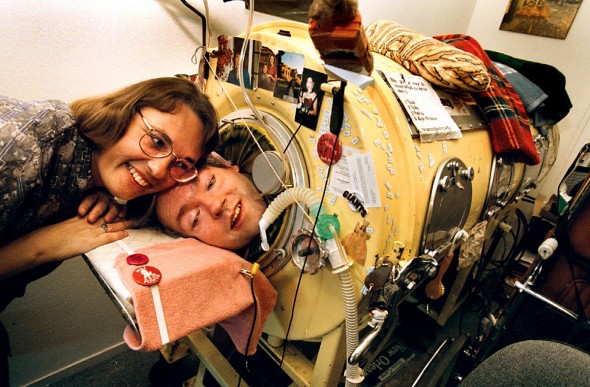
Mark O’Brien and his girlfriend Susan Fernbach cuddle outside his iron lung at his apartment in Berkeley in 1997. (Mary F. Calvert/Staff Archives) Photo: Mercurynews.com
Wow, this is my second anniversary of interviews- 24 really inspirational and enlightening people. There were {those infrequent} times when the end of the month was near with no takers and I’d be thinking, “I can’t lose out on this month.” And then one of my numerous requests would come through with a YES to being an interviewee. And so the inspiration continues; the lessons gleaned from people who don’t cave in to misfortune but rather branch out, grow and persevere, and even create new lives filled with meaning, purpose and joy. There’s richness to all. Sometimes we have to dig deeper; sometimes we have to push through harder; and sometimes we waver and sway but as long as we’re standing (sometimes in mind only) we can take that step forward and plow ahead using whatever we have.
And so it is with this month’s interviewee – plowing forward and using that which he had: a wonderful mind filled with beautiful prose and an attitude that pushed him to surpass all odds.
This interview is a bit unique in that the person of interest passed away. Mark O’Brien, a writer and poet, is the subject of the current highly acclaimed movie, TheSessions. He lived in an iron lung (due to polio at an early age) and was determined to have sex be a part of his life. I’ll leave the rest in the hopes that you’ll see this film as it is an amazing tribute to the will and spirit of a person. Humankind first, disability second.
This interview is being conducted with Susan Fernbach, Mr. O’Brien’s partner.
His sense of humor, his intelligence (I used to say he had a mind like Arnold Schwarzenegger’s body), a kind of patient tenacity. He once said that what most people think of as courage is really an extreme form of patience.
He turned it on its ear in his poetry and other writing, made fun of people’s pity for him and his own self-pity. In Breathing Lessons and in The Sessions, he and the character based on him somewhat facetiously blame God for his situation, making self-pity into a joke. However, his humor did not negate his feelings – it helped him cope.
He learned to manage his attendants, hiring and firing as needed, giving instructions to them on how he wanted to be assisted. He learned a lot of these management skills from other disabled people in Berkeley. He learned gratitude, which helped him focus on the things that were going right, and he had a spiritual life connecting him to the Divine.
He set projects for himself that he could accomplish – starting an essay, writing a poem or a journal entry – and the sense of accomplishment helped give him impetus to keep going. When he felt afraid or discouraged he wrote down those feelings in journals or poetry, to get them out of himself.
He did things even though they scared him – “feel the fear and do it anyway” as the saying goes. He set goals and accomplished them. He built important connections within the disability community based on the “social model” of disability as a rights movement rather than the “medical model” which defines a person only as a set of deficits or conditions. His disabled friends were very important to his self-image and in reducing his sense of isolation.
Take what society says about you with a grain of salt, especially the media’s stereotypes. Don’t allow them to pigeonhole you. Set your own goals and celebrate their accomplishments. Don’t be denied a purpose for your life.
Read up on the disability rights movement and find out about the courage of people in wheelchairs who chained themselves inside San Francisco’s federal building to demand enforcement of anti-discrimination laws. They are inspiring.
Join groups or online forums where you can communicate with other disabled people. You are far from alone. Mark used to say that everyone will be disabled if they live long enough.
Notes to those who love a disabled person:
Be honest and gentle with yourself about your grief. Their loss of ability is a loss for you too. Being a poet myself, I wrote down my grief about Mark’s limitations into several poems.
You may feel like all that matters is your loved one’s state of mind and re-hab/goals/accomplishments. For a while, at the beginning of a disability, that may be true, when everyone is in crisis mode. After a while, however, even though it’s hard to do, it’s important to reclaim some of your own focus, goals and projects. These can help recharge your batteries and help you feel good about something, especially amidst the grief that comes with loss of ability.
Although you may want your loved one to overcome his/her condition, don’t allow yourself to be made responsible for their state of mind.
Find other people with disabled loved ones. They understand the fatigue and grief that comes with the territory. There are many resources for this on the web for specific conditions and diagnoses.
If you find yourself in the role of caregiver, try to find support. Many senior centers or center for independent living have resources like this.
Excerpt from The Man in the Iron Lung:
Three Reasons to Live
The Practical
o God, it was boring
but there was nothing else
so I did it
got it out of the way
The Spiritual
we had this deal going
like God gave me life
for a while
I gave him gratitude
for a while and
it worked out ok
The Intellectual
things just kept happening
you know how every day is different?
and I just wanted to see
what would happen next.
May, 1995
Check out Mr. O’Brien’s autobiography here.